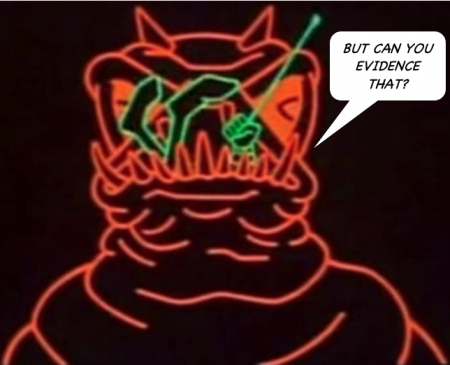Audit paradox: Difference between revisions
Amwelladmin (talk | contribs) No edit summary |
Amwelladmin (talk | contribs) No edit summary |
||
| Line 1: | Line 1: | ||
{{a|tech|}}{{Buchstein}}’s audit [[:Category:Paradox|paradox]] observes that, should you use workflow tools, [[legaltech]] and automation to carry out rudimentary tasks they will, by their nature, force you into sub-optimal behaviour patterns. In other words a tool that is meant to ''save'' work and ''reduce'' anxiety actually creates ''more'' of it. | {{a|tech| | ||
[[File:Ravenous bugblatter beast of Traal.png|450px|frameless|center]] | |||
}}{{Buchstein}}’s audit [[:Category:Paradox|paradox]] observes that, should you use workflow tools, [[legaltech]] and automation to carry out rudimentary tasks they will, by their nature, force you into sub-optimal behaviour patterns. In other words a tool that is meant to ''save'' work and ''reduce'' anxiety actually creates ''more'' of it. | |||
The [[audit paradox]] is at the confluence of three streams of modern institutional thinking: | The [[audit paradox]] is at the confluence of three streams of modern institutional thinking: | ||
*'''The [[buttocractic oath]]''': One’s first priority is to one’s own posterior. ''[[Primum nil errare]]'': First, do no harm ''to your own career''. | *'''The [[buttocractic oath]]''': One’s first priority is to one’s own posterior. ''[[Primum nil errare]]'': First, do no harm ''to your own career''. | ||
*'''[[Casanova’s advice]]''': [[If in doubt, stick it in]]: it won’t do any harm to ''ask'' for contractual protections we don’t in point of fact, really need. | *'''[[Casanova’s advice]]''': [[If in doubt, stick it in]]: it won’t do any harm to ''ask'' for contractual protections we don’t in point of fact, really need. | ||
*'''The world consists of what can be measured''': The ultra-[[reductionist]] view that as long as you can measure something you can control it. | *'''The world consists of what can be measured''': The ultra-[[reductionist]] view that as long as you can measure something you can control it, which bleeds into the converse, and entirely false, assumption, that ''if you can’t see it, it can’t be there''. | ||
Therefore an [[audit officer]] reminds us of the {{hhgg}}’s Ravenous Bugblatter Beast of Traal: a “mind-bogglingly stupid animal, it assumes that if you can’t see it, it can’t see you—daft as a brush, but very very ravenous”. | |||
{{c|Paradox}} | {{c|Paradox}} | ||
Revision as of 15:02, 27 May 2022
|
The JC pontificates about technology
An occasional series.
|
Büchstein’s audit paradox observes that, should you use workflow tools, legaltech and automation to carry out rudimentary tasks they will, by their nature, force you into sub-optimal behaviour patterns. In other words a tool that is meant to save work and reduce anxiety actually creates more of it.
The audit paradox is at the confluence of three streams of modern institutional thinking:
- The buttocractic oath: One’s first priority is to one’s own posterior. Primum nil errare: First, do no harm to your own career.
- Casanova’s advice: If in doubt, stick it in: it won’t do any harm to ask for contractual protections we don’t in point of fact, really need.
- The world consists of what can be measured: The ultra-reductionist view that as long as you can measure something you can control it, which bleeds into the converse, and entirely false, assumption, that if you can’t see it, it can’t be there.
Therefore an audit officer reminds us of the The Hitch-Hiker’s Guide to the Galaxy’s Ravenous Bugblatter Beast of Traal: a “mind-bogglingly stupid animal, it assumes that if you can’t see it, it can’t see you—daft as a brush, but very very ravenous”.
